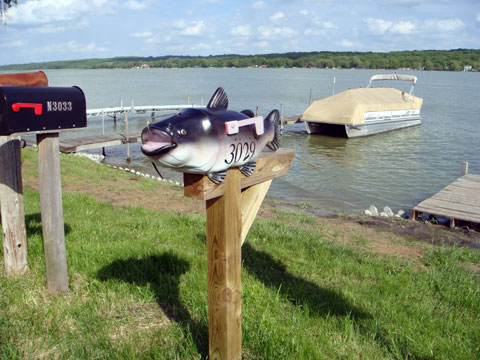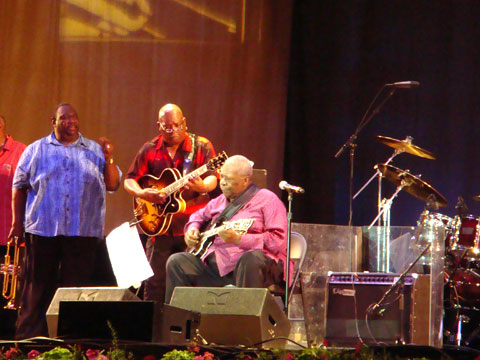Wordless Wednesday - Fish Mailbox Along Lake Como, Wisconsin

Did you enjoy reading this? You are welcome to subscribe to The Hot Iron by RSS feed or by email.
6 Questions with John Wall
 1 - Who are you, and what are you doing here?
1 - Who are you, and what are you doing here?
My name is John Wall and I enjoy Technology, Learning and Marketing. During the day I work at AccuRev, the company with the best version control tool available at any price. In my spare time I've been experimenting with social media like blogs and podcasts.
You can find out all about me at RoninMarketeer.com.
2 - You have been podcasting since 2005. What good and bad have you seen evolve in the podcasting world over time?
The good is really simple - for anyone that considers radio dead, boring, or repetitive there's now a huge world of audio content out there beyond audiobooks. The bad is that tons of it is garbage that the average person can't bear to listen to. It's been fun to watch as the landscape and business models of media have been completely destroyed and are now being rebuilt.
 3 - How would you say the rebuilding of media business models is going?
3 - How would you say the rebuilding of media business models is going?
If you are Apple, TiVo, Amazon or NPR, things are great. ClearChannel, Satellite Radio, or a store selling CDs, not so much.
I'm surprised that "Big Media" is coming around faster than I thought they would, but also surprised not to see any superstars or millionaires yet.
4 - Will there be a decline of superstars, and an increase of people being stars within niches?
Yes, absolutely. Media is fragmenting at an accelerating rate. Mass media is slowly falling apart. These are just figures off the top of my head, but the MASH finale was the most watched show on TV at something like 106 million, the biggest thing going now is the Super Bowl down around 97. Between TV, Web, Movies, Magazines, Podcasts, Newspaper, Radio and DVDs, consuming media has gone from a modest selection to more than one individual can comprehend.
5 - You host 2 podcasts, The M Show and Marketing Over Coffee. How do you stay on the edge with them and how do you see them evolving?
Marketing Over Coffee is content based on what I do for a living so I am gathering content for that program during every waking hour. The program has been growing at a stable rate for over a year, has sponsorship, and is a great platform for Christopher Penn and I to get our message out. It will continue to grow and expand.
The M Show is at the other end of the spectrum. It was built with old media in mind (I patterned it after Don Imus' radio program) and unfortunately even though tools that allow you to compete with big media are now available for all at next to nothing, the downside is that you have to compete against the entire world. Although the M Show is fun to do, it's proved not to be a viable business. Ultimately I'll leave the feed open for fun stuff, but Marketing Over Coffee will end up using all the resources that go to it (e.g. my time).
6 - What is one question I did not ask, and what is its answer?
Does any of this social media stuff provide business value? Can you make money doing it? The answer is yes and no. On it's own, social media is useless, it exists only to magnify and amplify what you already have to show or say. Think of it as the internet in 1996, if you have a well-crafted message, this is another venue to get it out to the world. If you've got nothing to say, you can say it louder, but that still doesn't mean that anyone is going to care.
Did you enjoy reading this? You are welcome to subscribe to The Hot Iron by RSS feed or by email.
To WWW Or Not To WWW
Do you need to include the “www.” when displaying a URL? This was a recent topic on Seth Godin’s blog, and reading various other blog posts and articles on the topic, the general consensus is you do not need to include the www-dot before a domain name. When someone sees a domain name all by itself, they assume it’s a Web site. But does it mean that every time you enter just a domain name you will get the Web site?
Unfortunately the answer to this is no. And it has nothing to do with marketing or how much room you have to display a domain name. It has to do with Web server and network configuration.
Here’s an example of where leaving out the www-dot will not show you the Web site. Berkshire Hathaway is the multi-billion dollar empire of Warren Buffett. Though he hangs out will his fellow top-tier billionaire Bill Gates, he shuns technology whenever possible. Berkshire Hathaway does have a Web site, albeit extremely simple. If you browse to it at http://www.berkshirehathaway.com you will be presented with the Web site. However, leave off the www-dot going to http://berkshirehathaway.com and you get an error.
The www-dot in question is called a subdomain, and is used to identify various types of servers on a domain. If you have ever configured Outlook or an email program with an email server, you probably entered a server name beginning with mail-dot. As a result, using – and not using – the www-dot subdomain needs to be configured. It needs to be addressed within the network domain configuration as well as the Web server or servers. It must be configured and tested properly, as leaving off the www-dot can be configured to take you to an altogether different Web site!
Why not take this time to check your own Web sites and blogs to see if they pass the test of leaving off the www-dot. And while you’re at it, check your vendors, partners and even competitors. Good luck telling them if doesn’t work – I emailed Berkshire Hathaway over a month ago when I first saw this problem, and it still exists.
Did you enjoy reading this? You are welcome to subscribe to The Hot Iron by RSS feed or by email.
SSL Certificates Are Not Just For eCommerce
 Security is one of the keys to having a successful eCommerce Web site. Forming a trusted relationship with your customer is important. Having great products is somewhere high on the list too, but I digress. A key component to eCommerce security is the SSL certificate. Without getting into the technical details, it verifies who you are doing business with online, and that any information passed from the client’s browser to the Web server is secured.
Security is one of the keys to having a successful eCommerce Web site. Forming a trusted relationship with your customer is important. Having great products is somewhere high on the list too, but I digress. A key component to eCommerce security is the SSL certificate. Without getting into the technical details, it verifies who you are doing business with online, and that any information passed from the client’s browser to the Web server is secured.
For many people, owners of Web sites and those who develop them, eCommerce is the only use for SSL certificates considered. However, in a time of increased identity theft and fraud, an expanded use of SSL certificates, and thus higher security, should be utilized for Web sites that may not engage in eCommerce, but capture information.
Take the example of the common “contact us” form. It consists of form fields asking for identifying information (e.g. name, email, phone) and commonly has a text box where the Web visitor can enter any text. The key word here is “any.” As the level of sophistication of Web users vary, someone may enter sensitive information on such a contact form, including a username/password combination or even a social security number. There is no way to know what they will enter and submit to you until they do so. Where you can put a message on a Web form strongly urging people not to enter sensitive information, this still does not prevent it from happening.
The contact form on the Dunkirk Systems, LLC Web site is secured with an SSL certificate. I did this for the reason above, plus as it is a service we offer, it in itself is a showcase example. In the past we delivered a similar solution for a mortgage company’s contact form, as they could get people submitting all sorts of sensitive information via the form, including social security numbers.
Take a look at your Web site, and take a look what people are submitting to you via the Web site. Adding a little extra security may make your normal business transactions into win-win situations.
Did you enjoy reading this? You are welcome to subscribe to The Hot Iron by RSS feed or by email.
Wordless Wednesday - B.B. King At The 2008 Chicago Blues Festival

Did you enjoy reading this? You are welcome to subscribe to The Hot Iron by RSS feed or by email.
Page 146 of 217 pages ‹ First < 144 145 146 147 148 > Last ›


